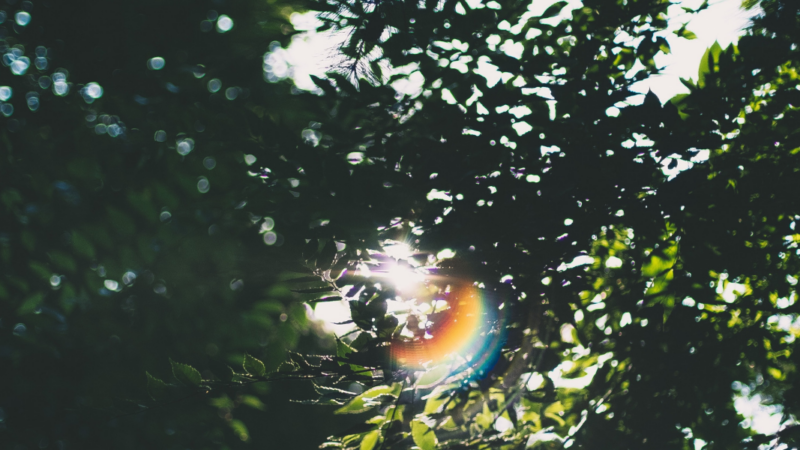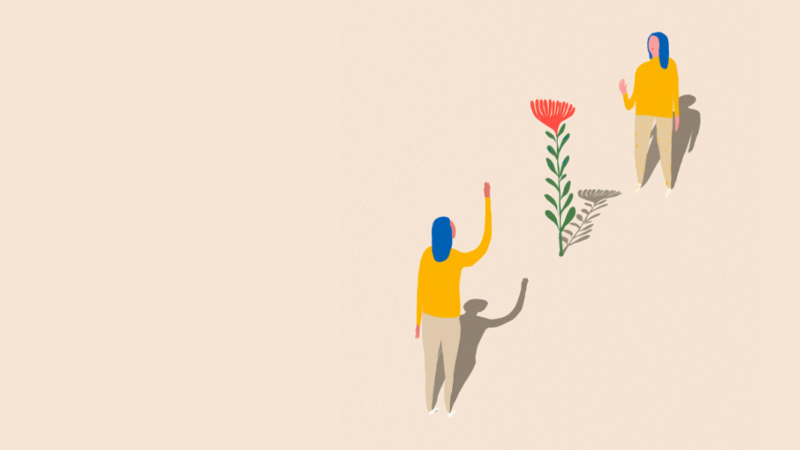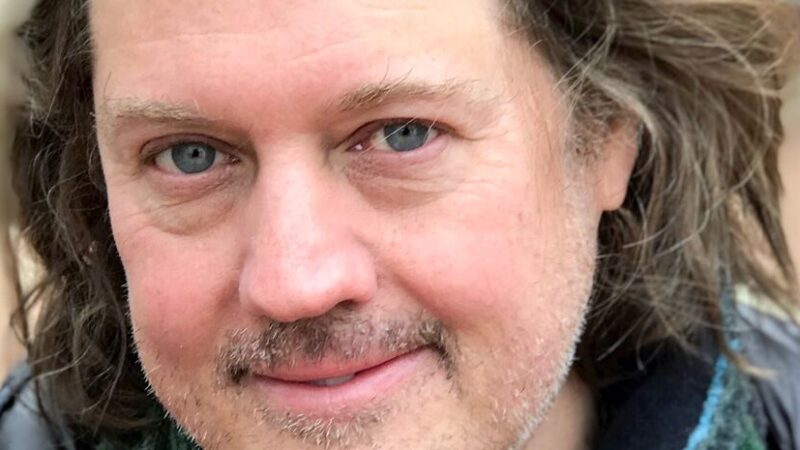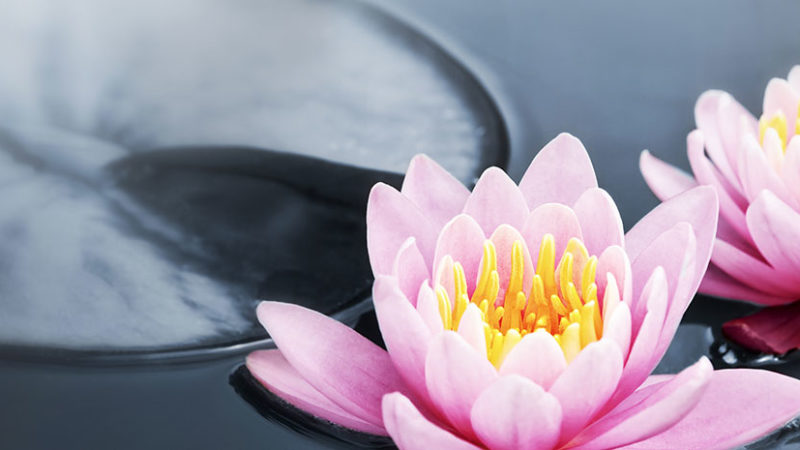-
E90: How to Stop Minding and Start Living
Michael Singer — June 29, 2025
“Do you mind?” We “mind” everything, from traffic to childhood memories, and this habitual...
-
Cyndi Dale: Becoming Your Own Best Ancestor
Cyndi Dale — July 1, 2025
On the surface, it appears as though the lives we live proceed forward moment by moment in a...
-
Honey Tasting Meditation: Build Your Relationship with Sweetness
There is a saying that goes “hurt people hurt people.” I believe this to be true. We have been...
Written by:
Amy Burtaine, Michelle Cassandra Johnson
-
Many Voices, One Journey
The Sounds True Blog
Insights, reflections, and practices from Sounds True teachers, authors, staff, and more. Have a look—to find some inspiration and wisdom for uplifting your day.
Standing Together, and Stepping Up
Written By:
Tami Simon -
The Michael Singer Podcast
Your Highest Intention: Self-Realization
Michael Singer discusses intention—"perhaps the deepest thing we can talk about"—and the path to self-realization.
This Week:
E90: How to Stop Minding and Start Living -
Many Voices, One Journey
The Sounds True Blog
Insights, reflections, and practices from Sounds True teachers, authors, staff, and more. Have a look—to find some inspiration and wisdom for uplifting your day.
Take Your Inner Child on Playdates
Written By:
Megan Sherer
600 Podcasts and Counting...
Subscribe to Insights at the Edge to hear all of Tami's interviews (transcripts available, too!), featuring Eckhart Tolle, Caroline Myss, Tara Brach, Jack Kornfield, Adyashanti, and many more.
Most Recent
Why We Need To Live the Full Spectrum of Human Experie...
Metabolizing Experience
In order to know and befriend ourselves at the deepest levels, one of the core foundations for true healing, we must cultivate a new way of relating with ourselves that allows even our most difficult and challenging experience to disclose its meaning, intelligence, and purpose in our lives. To do this, we have to slow down and shift our relationship from one of thinking about our experience to fully embodying it. We have to allow ourselves to truly touch it and be touched by it rather than merely orbiting around it, where we are sure to continue to feel some degree of disconnection. Just as we must properly digest the food we eat to absorb its nutrients, we must also assimilate our experience to receive the wisdom and sacred data within it. All through the day and night, we are receiving impressions—through our mental, emotional, somatic (i.e., body-based), imaginal, and spiritual bodies. Life is a constant stream of experience—conversations with friends, caring for our kids, cooking a meal, wandering in nature, practicing yoga or meditation, engaging our work and creative projects, reading a book, shopping for groceries, running errands. But to what degree are we experiencing all of this? How present are we to our moment-to-moment experience, embodied and engaged, allowing it to penetrate us, where it can become true experience and not just some passing event? To what degree are we on autopilot as we make our way through the day, only partially connecting with our friends and family and engaging the sensory reality of what we see, hear, smell, taste, and touch?
I’m pointing toward a way of “metabolizing” our experience that allows us to touch and engage it at the most subtle levels, where it is able to disclose its qualities, intelligence, and purpose. By evoking “metabolization,” I am making use of a biological process in a metaphorical way to refer to working through and integrating our experience, especially those thoughts, feelings, sensations, and parts of ourselves that historically we have pushed away. Other words from the biological sciences, for example “digestion,” “absorption,” or “assimilation” can be used to point to the same idea, indicating that it requires concentration, attention, and a certain fire or warmth to “make use” of our experience and mine the “nutrients” contained within it.
Just because we “have” an experience does not mean we properly digest and absorb it. If our emotional and sensory experience remain partly processed, they become leaky (a psychic version, if you will, of “leaky gut syndrome”) and unable to provide the fuel required to live a life of intimacy, connection, and spontaneity. This inner psychic situation is analogous to not properly chewing and breaking down the food we eat and thus not being able to mine the energy and nutrients our bodies need to function optimally.
Although the desire for change and transformation is natural, noble, and worthy of our honor and attention, if we are not careful, it can serve as a powerful reminder and expression of the painful realities of materialism and self-abandonment. One of the shadow sides of spiritual seeking and the (seemingly) endless project of self-improvement is that we never slow down enough to digest what we have already been given, often much more than we consciously realize. In some sense, most of us have been given everything in terms of the basic alchemical prima materia required to live a life of integrity and inner richness, but not the “everything” the mind thinks it needs to be happy and fulfilled, found by way of a journey of internal and external consumerism. And not the “everything” that conforms to our hopes, fears, and dreams of power and control and that keeps us consistently safe and protected from the implications of what it means to have a tender (and breakable) human heart, but the “everything” already here as part of our true nature, the raw materials for a life of inner contentment and abundance, revealed by way of slowness and humility, not unconscious acquisition.
It is important to remember that for most of us, healing happens gradually, slowly, over time when we begin to perceive ourselves and our lives in a new way. Each micro-moment of new insight, understanding, and perspective must be integrated and digested on its own, honored and tended to with curiosity, care, and attention. Before we “move forward” to the next moment, we must fully apprehend and open our hearts to this one; this slow tending (metabolization) is one of the true essences of a lasting, transformative, and deep healing. If we are not able to metabolize even our most intense and disturbing experience, we will remain in opposition to it, at subtle war with it, and not able to be in relationship with it as a healing ally.
In Tibetan tradition, there is an image of the hungry ghost, a figure of the imaginal realms with a large, distended belly and tiny mouth. No matter how much food (experience) is consumed, there is a deep ache and longing for more. Regardless of how much is taken in, the ghost retains an insatiable hunger. Because this one is not able to digest, make use of, or enjoy what is given, a primordial hole is left behind that can never seem to be filled. One invitation, as this image appears in our own lives, is to slow way down and send awareness and compas- sion directly into the hole, infusing it with presence and warmth, and finally tend to what is already here, not what is missing and might come one day in the future by way of further procurement.
Just as with food—choosing wisely, chewing mindfully, allowing ourselves to taste the bounty of what is being offered, and stopping before we are full—we can honor the validity, workability, and intelligence of our inner experience, even if it is difficult or disturbing. The willingness to fully digest our own vulnerability, tenderness, confusion, and suffering is an act of love and fierce, revolutionary kindness. There are soul nutrients buried in the food of our embodied experience that yearn to be integrated, metabolized, and assimilated in the flame of the heart. But this digestion requires the enzymes of presence, embodi- ment, compassion, and curiosity about what is here now.
Let us slow down and become mindful of the ways we seek to fill the empty hole in the center, whether it be with food when we’re not hungry or experience when we are already full. And in this way, we can walk lightly together in this world, on this precious planet, not as hungry ghosts desperate to be fed but as kindred travelers of interior wealth, richness, and meaning.
This is an excerpt from A Healing Space: Befriending Ourselves in Difficult Times by Matt Licata, PhD.
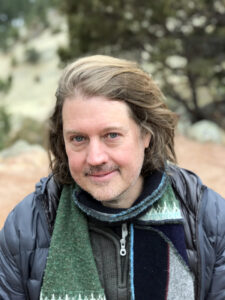 Matt Licata, PhD, is a practicing psychotherapist and hosts in-person retreats. His work incorporates developmental, psychoanalytic, and depth psychologies, as well as contemplative, meditative, and mindfulness-based approaches for transformation and healing. He co-facilitates a monthly online membership community called Befriending Yourself, is author of The Path Is Everywhere, and is the creator of the blog A Healing Space. He lives in Boulder, Colorado. For more, visit mattlicataphd.com.
Matt Licata, PhD, is a practicing psychotherapist and hosts in-person retreats. His work incorporates developmental, psychoanalytic, and depth psychologies, as well as contemplative, meditative, and mindfulness-based approaches for transformation and healing. He co-facilitates a monthly online membership community called Befriending Yourself, is author of The Path Is Everywhere, and is the creator of the blog A Healing Space. He lives in Boulder, Colorado. For more, visit mattlicataphd.com.
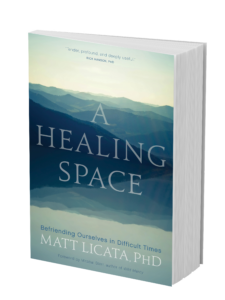
Learn More
Sounds True | Amazon | Barnes & Noble | Bookshop | Indiebound
Tools for Cultivating Supportive Friendships & Re...
Tools for Cultivating Supportive Friendships & Relationships:
CHRISTOPHE ANDRÉ:
For this toolbox I’d like to put forward a little bit of theory about how we are supported by relationships — that is, to offer an overall look at what we receive from our relationships with others.
The five benefits of relationships. Studies show that social support can be broken down into several families of benefits:
- Material support: Others can help us in concrete ways. If I’ve broken my leg, I will be glad if somebody will do my shopping for me. If I have to move, I will be happy to have my friends help me transport the boxes.
- Informational support: Others can advise us, give us useful infor- mation, and play the role of human search engines — as intelligent as Google but alive and compassionate — and they won’t resell our personal information afterward.
- Emotional support: Others are the source of positive emotions; they give us affection, love, friendship, trust, admiration.
- The support of esteem. Others can remind us of our value and good qualities, tell us what they like about us, and sustain our self-esteem at moments of uncertainty.
- The inspiration of their example: This is more difficult to evaluate scientifically, but it’s quite real, as we have indicated.
The four varieties of relationships. Another important point is that it is helpful to cultivate varied social relationships, just as it is important to have a varied diet. There are four families of relationships, distributed in four concentric circles:
- Our intimates: the people we live with, whom we touch and embrace practically every day. This means mostly our family and best friends.
- Our close relations: our friends and colleagues, people with whom we regularly have close and regular exchanges.
- Our acquaintances: the whole network of people with whom we have a connection, even occasional, and who we keep track of and who keep track of us.
- Unknowns: those who we might also have relationships with, depending on our character. This includes people we might speak to on the street, on public transport, in stores. They can also be sources of help or information for us, as we can for them.
Specialists in social relations remind us that it is important to draw sup- port from these four circles — not only from our intimate and close relations—and to sustain our connections with these four relational spheres by giving and receiving help, information, support, eye contact, advice, and smiles. Because the idea is not only to receive but also to give, by speaking to unknowns and maintaining warm relations with our acquaintances, neighbors, and shopkeepers, we do ourselves good. And we embellish the world, improve it, and make it more human!
MATTHIEU RICARD:
The importance of social connection. We should choose to live in an environment where people are warm, altruistic, and compassionate. If this isn’t the case in all areas of our living space, we should progressively try to establish these values or, if it’s possible, we should leave the toxic environment.
In this connection, I like to cite the case of a community on the Japanese island of Okinawa, which claims to have one of the world’s highest concentrations of people aged a hundred or over. It appears that the main factor in this exceptional longevity is not the climate or the food, but the power of this community, where people maintain particularly rich social relationships. From cradle to grave, they relate very closely with one another. The elderly people in particular get together several times a week to sing, dance, and have a good time. Almost every day they go to schools to greet the children (whether they have familial links with them or not) at the end of the school day. The elders take the children in their arms and give them treats.
Draw inspiration from the righteous, from people who, in our eyes, embody the values of impartiality, tolerance, compassion, love, and kindness. In these times of the migratory crisis, I think of all those who have taken great risks, and I remember those who protected Jewish people during the Nazi persecutions of World War II, particularly those who hid Jews in their homes. These people have since come to be called “The Righteous.” The only common point that emerges from their many accounts is a view of others based on recognition of their common human- ity. All human beings deserved to be treated with kindness. Where we saw a stranger, they saw a human being.
Meditate on altruistic love. Studies in psychology have shown that meditating on altruistic love increases people’s feelings of belonging to a community; it enhances the quality of social connections and compassionate attitudes toward unknown people, while at the same reduc- ing discrimination toward particular groups, like people of color, homeless people, and immigrants.
Draw inspiration from friends in the good and spiritual masters. I recommend that everyone see a historical documentary made in India by Arnaud Desjardins at the end of the 1960s, in which we are shown the most respected of the Tibetan masters who took refuge on the Indian slopes of the Himalayas following the Chinese invasion of their country. The film is called The Message of the Tibetans.
ALEXANDRE JOLLIEN:
The audacity to live. Existing, opening oneself to the other, is running a risk. It means dropping one’s armor, one’s protective coverings, and opening one’s eyes and daring to give oneself to the other and to the entire world. There’s no way you can invest in a relationship, so throw out your logic of profit and loss! What if we were to embark on our day without any idea of gain or of using our fellow human beings? What if we stayed attentive to all the women and men it is given to us to encoun- ter on that day, looking to find among them masters in being human?
Identify our profound aspirations. Helping others can often amount to imposing a view of the world on them without really paying any attention to what they really want in their hearts. A man bought an elephant without giving any thought in advance to how he was going to feed it. At a loss, he was obliged to turn for help to those around him, and what he got from them was, “You never should have bought such a big animal!” What does it mean to help others? Does it mean committing completely to being there for them? Does it mean going all the way with them?
Authentic compassion. A will to power might enter into our move- ment toward the other—a thirst for recognition, a twisted attempt to redeem ourselves. Daring a true encounter means quitting the sphere of your neurosis and walking the path of freedom together. There’s no more “me,” no more “you,” but a coalescent “us,” a primordial solidarity.
Coming out of the bunker. As a result of having been burned in our relationship with another, the temptation is great to put on armor, to completely shut ourselves up in a bunker-like fortress, even to the point of suffocation. Don’t our passions, our griefs, our loves, and the fierce- ness of our desire remind us that we are essentially turned toward the other, in perpetual communication? Is there a way to live the thousand and one contacts of daily life without our ego appropriating them?
This is excerpted from the newest book from Matthieu Ricard, Christophe André, and Alexandre Jollien, Freedom For All Of Us: A Monk, A Philosopher, and a Psychiatrist on Finding Inner Freedom.
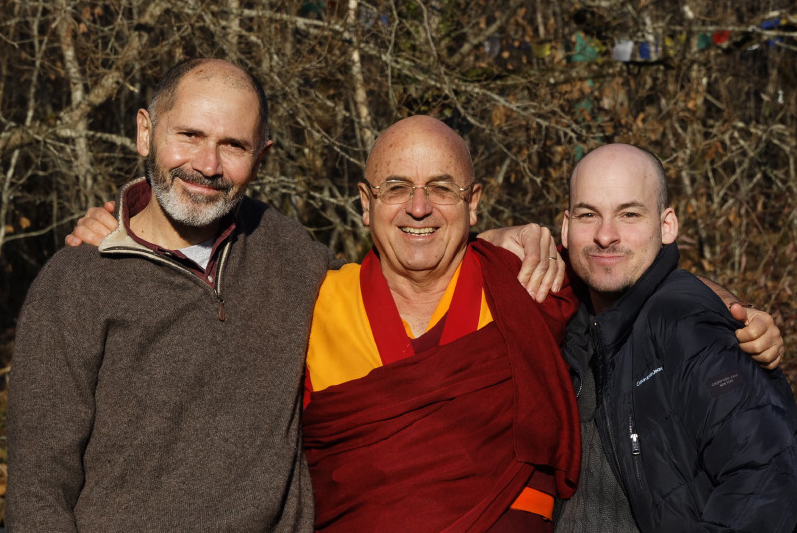
Matthieu Ricard is a Buddhist monk, a photographer, and a molecular geneticist who has served as an interpreter for the Dalai Lama.
Christophe André is a psychiatrist and one of the primary French specialists in the psychology of emotions and feelings.
Alexandre Jollien is a philosopher and a writer whose work has been attracting an ever-growing readership. Together, they are the authors of In Search of Wisdom and Freedom For All of Us.
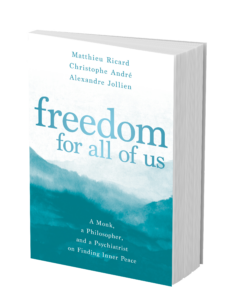
Learn More
Sounds True | Amazon | Barnes & Noble | Bookshop | IndieBound
Matt Licata, PhD: The Alchemy of Befriending Ourselves...
Matt Licata is a practicing psychotherapist, a co-facilitator of a monthly online membership community called Befriending Yourself, and the author of The Path Is Everywhere. With Sounds True, he has written a new book titled, A Healing Space: Befriending Ourselves in Difficult Times. In this episode of Insights at the Edge, Tami Simon speaks with Matt about what it is to be a healing space, that is to hold space for ourselves and others, as well as how we can feel held by something greater than ourselves during challenging experiences. They also explore our inner wounds and self-abandonment, spiritual bypassing and the ways in which many practices allow us to gloss over the real healing needed, and how coming into an embodied state can open us to greater inner depths. Finally, Tami and Matt discuss becoming an alchemist of your own life, discovering the inner gold that each of us has within, and befriending all of ourselves.
Customer Favorites
Guided Meditation: Accepting Your Experience Just as I...
If you have traveled on the spiritual path even a little way, you have probably come across some version of “love what is”—a reminder that you should accept your experience as it is. However, this teaching easily becomes another injunction. Notice the should in the earlier sentence—it is always a red flag that the judging mind is at work.
The conditioned mind cannot accept unconditionally. It always has an agenda, even if it is well hidden. It secretly bargains and sends the message, “I will accept you [sotto voce] if you change or leave.” This approach is akin to welcoming guests at your front door while secretly hoping they will exit out the back—the sooner, the better! Guests—our unwanted thoughts, feelings, and sensations—will certainly feel this conditional invitation, even if it is unspoken. As a result, they will be much less willing to enter, relax, and reveal themselves. The result? What we resist, persists. So when your new arrivals show up at your door, put away your timer and share some aromatic green tea and a raspberry scone with them. Settle in and let them tell their stories and share their feelings. They just want to be heard and understood. Once they feel genuinely received, they will be open to a new perspective.
Are you willing to be with your experience just as it is, even if it never changes? This is a critically important checking question. Take a few minutes to inquire with the following practice.
MEDITATIVE INQUIRY
Are You Willing to Accept Your Experience Just as It Is?
Sit quietly where you won’t be disturbed, close or lower your eyes, and take a few deep breaths. Feel the weight of your body held by whatever you are sitting on and relax. Feel your attention settling down and in.
Think of a troubling aspect of your conditioning—an unwelcome pattern of behavior, reactive feeling, bodily tension, or invasive thought. Then ask yourself: “Am I willing to accept this just as it is?”
If your response comes from the strategic mind, there will be an honest no. This is good to see. If this is the case, try asking the question a little differently: “Is there something in me that already accepts this just as it is?”
If your attention has settled into the Deep Heart, you will find a yes.
Journey into the depths of your own heart with Dr. John J. Prendergast’s guide, The Deep Heart: Our Portal to Presence.
Cyndi Dale: Energetic Boundaries
Tami Simon speaks with Cyndi Dale, an internationally renowned author, speaker, intuitive healer, and business consultant. Cyndi has written several ground-breaking books on chakras and intuition, including with Sounds True The Subtle Body: An Encyclopedia of Your Energetic Anatomy, Illuminating the Afterlife: Your Soul’s Journey Through the Worlds Beyond, and most recently, Energetic Boundaries: How to Stay Protected and Connected in Work, Love, and Life. Tami speaks with Cyndi about how we can assess our energetic health to locate the “holes” in our own boundaries, what healthy energetic boundaries might look and feel like, and how healers and other sensitive people can keep their center and maintain the integrity of their energetic boundaries. (79 minutes)
Bruce Tift: Buddhism Meets Psychotherapy
Bruce Tift has been a psychotherapist since 1979, a practitioner of Vajrayana Buddhism for more than 35 years, and has taught at Naropa University for 25 years. He is the author of the Sounds True audio learning course Already Free: Buddhism Meets Psychotherapy on the Path of Liberation. In this episode of Insights at the Edge, Tami Simon speaks with Bruce about his perspectives on therapy as informed by Buddhist insights—examining how our “neurotic organization” exists to insulate us from legitimate suffering, why much of our growth comes from acting in ways that are counter-instinctual, and what it might mean to practice psychotherapy with the view that there is no problem we actually need to solve. (66 minutes)
